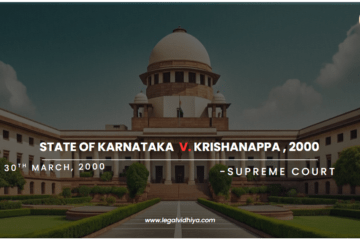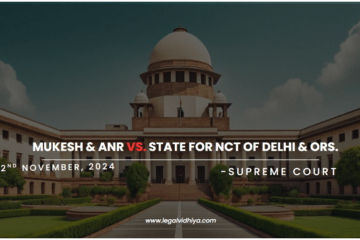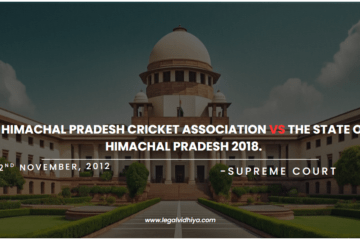
CASE ANALYSIS OF STATE OF BIHAR VS CHANDRA BHUSHAN SINGH AND ORS.
| Case Name: | State of Bihar versus Chandra Bhushan and Ors. |
| Equivalent Citation: | AIR 2001 SC 429 : (2001)2 SCC 241 |
| Date of Judgement: | December 13, 2000 |
| Court: | Supreme Court of India |
| Case No. : | Criminal Appeals No. 1111-12 of 2000 |
| Case Type: | Criminal Appeal |
| Appellant: | State of Bihar |
| Respondents: | Chandra Bhushan Singh and others |
| Bench: | Division Bench ( Hon’ble Justices K.T. Thomas and R.P. Sethi) |
| Laws applied: | Railway Property (Unlawful Possession) Act,1966- Sections 7 & 3The Code of Criminal Procedure, 1973- Sections 173, 200 and 2(d) expln. |
Facts of the Case
Respondents were accused of stealing railway cement and charged under Section 3 of the Railway Property (Unlawful Possession) Act,1966 (hereinafter referred to as “the Act”). The RPF inspector submitted an investigation report against the respondents before the Judicial Magistrate First Class of Samastipur. Respondents-accused filed a petition before the High Court challenging the magistrate’s decision to turn down their application for discharge. The high court allowed the petition and ordered that the proceedings be quashed against the accused. This order was challenged by the State in these appeals before the Supreme Court.
Issue raised
Whether an enquiry report by Railway Police Force (RPF) officer in relation to a non-cognizable offence deemed to be a report under section 173 of the Code for Criminal Procedure (hereinafter referred to as “the Code”) ?
Contention of the Respondents
The respondents argued that the accused should be discharged since the SI, RPF who filed the report against the respondent-accused was not a police officer referred to in section 173 of the Code. While quashing proceedings against respondent accused, the High Court relied on the SC’s decision in Balkishan A. Devidayal vs. State of Maharashtra. The respondents also argued that the matter should be sent back to the High Court for review of additional grounds seeking to terminate the proceedings. One of them was that the trial against the accused had been ongoing for five years and that, in accordance with a state government notification, the proceedings in this instance were susceptible to be annulled.
Contention of the Appellant
The counsel for the appellant argued that the respondents’ justifications are flawed. Any person who has allegedly committed an offence under the Act can be arrested, according to Section 6 of the Act, by an inspector officer of the RPF. The appellant additionally argued that the court should assess the parliament’s intent in granting the RPF officers the authority to investigate into and prosecute offence under the Act. The offences under the Act are non-cognizable, hence such offences can’t be investigated by the police officer in accordance with the Code. The appellant pleaded with the honourable Supreme Court to reverse the HC’s judgement and preserve the letter of the law.
Judgement
The bench allowed the appeals, overturned the high court’s decision, and confirmed the decision of the magistrate in refusing to discharge respondents from the case before him. The court additionally instructed the magistrate to rush the trial.
Rationale or Ratio Decendi
The court ruled that the RPF’s report cannot be deemed to be a report within the meaning of section 173 of the Code merely because the investigation was carried out by an inspector who had equivalent powers to an Investigating Officer. The report was rather deemed by the court to constitute a complaint brought before the magistrate in accordance with section 200 of the Code. The bench cited explanation to section 2(d) of the Code, which states that a police officer’s report in a case that reveals the commission of a non-cognizable offence shall be deemed to be a complaint.
The bench also believed the High Court’s rationale for using the Balkishan case, in which the court in context of section 25 of the Evidence Act held that an officer of the RPF could not be deemed to be a police officer, was flawed because the matter in hand involved section 173 of the Code.
The counsel for the respondents argued that since the trial had been ongoing for more than 5 years, it was subject to being dismissed in accordance with a purported notice made by the State Government. The court determined that this argument, however, cannot be adopted because the counsel did not present evidence of such notification.
The court noted that an officer conducting an inquiry pursuant to Section 8 of the Act does not possess all the authority of an officer conducting an investigation under Chapter XIV of the Code. As a result, the RPF officer lacked the authority to present a chargesheet to the magistrate in accordance with section 173 of the Code. Additionally, the Act’s primary goal was to grant RPF officers authority to investigate and prosecute incidents involving railway property. As a result an investigation for an offence under the Act can only be commenced on the basis of a complaint by an RPF officer.
Conclusion
This case had very peculiar facts but the judgement given by the Apex Court was well reasoned and well formatted. Overall conclusion was that even though the Railway Police Officers have been given powers equivalent to Police Officers in matters of investigation under the Act, the report submitted by such officers will be deemed to be a complaint and not a report. Another thing to appreciate is the keen eye of the Apex Court in pointing out how misconceived the High Court was in referring to the Balkishan Case which had a different context than the case present in the hand. It happens many times that courts rely on judgements which don’t fit in cases before them, therefore, it is the duty of the Appellate Courts to carefully understand the facts of the case as well as the rationale used by the lower courts while deciding a matter.
written by Charis Yadav intern under legal vidhiya




0 Comments